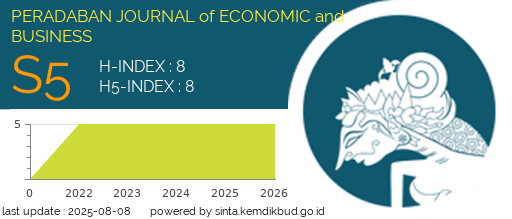Adaptive Stakeholder Management in Social Startups
Enhancing Social Impact and Economic Sustainability
DOI:
https://doi.org/10.59001/pjeb.v3i2.190Keywords:
digital engagement, emerging market, social startups, Stakeholder Relationship Management (SRM)Abstract
This research examines the implementation and outcomes of stakeholder relationship management (SRM) strategies in social startups, focusing on Indonesia's Social Organization Matchmaking program. Conducting by a qualitative approach, this study explores how the Outreach Campaign team designed and implemented SRM strategies to engage diverse Organizations within a resource-constrained, emerging market context. The findings highlight a multifaceted SRM approach encompassing strategic communication, personalized engagement, value co-creation, and digital interaction. This adaptive strategy significantly enhanced program outcomes, including a higher success rate in matching Organizations with sponsors, increased retention, and overall satisfaction. Key factors contributing to effective SRM were identified, such as fostering trust through transparent communication, cultivating commitment through shared value creation, and balancing digital and traditional engagement methods. Contextual factors, including cultural norms, economic realities, technological infrastructure, and regulatory environment, shaped SRM strategies.
References
Alim, S. (2024). The Basics of Communication Strategy in the Digital Age – Global Interactive Media. https://www.globinmedia.com/product/dasar-dasar-strategi-komunikasi-di-era-digital/
Arena, M., Bengo, I., Calderini, M., & Chiodo, V. (2018). Unlocking Finance for Social Tech Start-Ups: Is There a New Opportunity Space? Technological Forecasting and Social Change, 127, 154–165. https://doi.org/10.1016/j.techfore.2017.05.035
Battistella, C., Dangelico, R. M., Nonino, F., & Pessot, E. (2021). How Social Start‐ups Avoid Being Falling Stars When Developing Social Innovation. Creativity and Innovation Management, 30(2), 320–335. https://doi.org/10.1111/caim.12431
Browning, N., Lee, E., Park, Y. E., Kim, T., & Collins, R. (2020). Muting or Meddling? Advocacy as a Relational Communication Strategy Affecting Organization–Public Relationships and Stakeholder Response. Journalism & Mass Communication Quarterly, 97(4), 1026–1053. https://doi.org/10.1177/1077699020916810
Bush, P. L., Pluye, P., Loignon, C., Granikov, V., Wright, M. T., Repchinsky, C., Haggerty, J., Bartlett, G., Parry, S., Pelletier, J., & Macaulay, A. C. (2018). A Systematic Mixed Studies Review on Organizational Participatory Research: Towards Operational Guidance. BMC Health Services Research, 18(1). https://doi.org/10.1186/s12913-018-3775-5
Chen, Z. F., Ji, Y. G., & Men, L. R. (2021). Effective Social Media Communication for Startups in China: Antecedents and Outcomes of Organization–public Dialogic Communication. New Media & Society, 25(12), 3613–3640. https://doi.org/10.1177/14614448211051984
Conraud, T., Jammes, L., Morales, L. V., & Cordoba, J. (2014). Fair Dialogue and Co-Creation—A Shift in Stakeholder Engagement and Global Performance of Industrial Projects. https://doi.org/10.2118/168387-ms
creswell, J. W., & Poth, C. N. (2024, September 27). Qualitative Inquiry and Research Design. SAGE Publications Ltd. https://uk.sagepub.com/en-gb/asi/qualitative-inquiry-and-research-design/book266033
Doherty, B., Haugh, H., & Lyon, F. (2014). Social Enterprises as Hybrid Organizations: A Review and Research Agenda. International Journal of Management Reviews, 16(4), 417–436. https://doi.org/10.1111/ijmr.12028
Ghi, T. N., Anh, N. T. P., Thu., N. Q., & Huan, N. Q. (2020). Relationship Network and Business Model Innovation of Start-Up Companies in the Context of Industrial Revolution 4.0: An Evidence From Vietnam. https://doi.org/10.2991/aebmr.k.200127.033
Harrison, V. S., Buckley, C., & Xiao, A. (2020). The Roles of Donation Experience and Advocacy: Extending the Organization–donor Relationship Model. Journal of Communication Management, 25(1), 85–103. https://doi.org/10.1108/jcom-06-2020-0057
Hoang, T., & Lee, Y. (2022). Looking at the Nonprofit accountability‐charitable Donations Relationship Through the Publicness Lens. Nonprofit Management and Leadership, 33(2), 345–381. https://doi.org/10.1002/nml.21513
Hon, L., & Grunig, J. (1999). Guidelines for Measuring Relationship in Public Relations.
Jin, F., Wu, A., & Hitt, L. M. (2017). Social Is the New Financial: How Startup Social Media Activity Influences Funding Outcomes. Academy of Management Proceedings, 2017(1), 13329. https://doi.org/10.5465/ambpp.2017.13329abstract
Kang, M. (2016). Moderating Effects of Identification on Volunteer Engagement: An Exploratory Study of a Faith-Based Charity Organization. Journal of Communication Management, 20(2). https://doi.org/10.1108/jcom-08-2014-0051
Kembau, A. S., Supit, V., & Langi, C. (2019). Implementation of Integrated Marketing Communication (IMC) in Higher Education as an Adaptive Move in the Era of Industrial Revolution 4.0: A Case Study in Manado State Polytechnic. Journal of International Conference Proceedings, 2(2), 7–18. https://doi.org/10.32535/jicp.v2i2.598
Lee, C., & Nowell, B. (2014). A Framework for Assessing the Performance of Nonprofit Organizations. American Journal of Evaluation, 36(3), 299–319. https://doi.org/10.1177/1098214014545828
Liu, B., Lu, L., Zhang, H., & Liu, C. (2021). Strategic Choices for Social Responsibility of Startups in China. Frontiers in Psychology, 12. https://doi.org/10.3389/fpsyg.2021.719454
Men, L. R., Chen, Z. F., & Ji, Y. G. (2021). Cultivating Relationships With Startup Employees: The Role of Entrepreneurs’ Leadership Communication. Management Communication Quarterly, 35(4), 518–545. https://doi.org/10.1177/08933189211017918
Miles, M. B., Huberman, A. M., & Saldana, J. (2014). Qualitative Data Analysis. SAGE.
Nguyen, L. K. N., Kumar, C., Shah, M., Chilvers, A., Stevens, I., Hardy, R., Sarell, C. J., & Zimmermann, N. (2023). Civil Servant and Expert Perspectives on Drivers, Values, Challenges and Successes in Adopting Systems Thinking in Policy-Making. Systems, 11(4), 193. https://doi.org/10.3390/systems11040193
Nwachukwu, C., & Vu, H. M. (2021). Assessing Supplier-Customer Relationship Management Practice and Business Performance. https://doi.org/10.4108/eai.7-6-2021.2308605
Puyvelde, S. V. (2011). The Governance of Nonprofit Organizations. Nonprofit and Voluntary Sector Quarterly, 41(3), 431–451. https://doi.org/10.1177/0899764011409757
Roumpi, D., Μαγρίζος, Σ., & Nicolopoulou, K. (2019). Virtuous Circle: Human Capital and Human Resource Management in Social Enterprises. Human Resource Management, 59(5), 401–421. https://doi.org/10.1002/hrm.22002
Shah, A. (2012). Business Strategies in the Emerging Markets. Journal of Asia-Pacific Business, 13(1), 4–15. https://doi.org/10.1080/10599231.2011.616143
Shen, H. (2016). Refining Organization–Public Relationship Quality Measurement in Student and Employee Samples. Journalism & Mass Communication Quarterly, 94(4), 994–1010. https://doi.org/10.1177/1077699016674186
Swanson, L. A. (2012). A Strategic Engagement Framework for Nonprofits. Nonprofit Management and Leadership, 23(3), 303–323. https://doi.org/10.1002/nml.21067
Tran, G. N. (2023). Social Capital and Digital Transformation of Startups in Vietnam: The Mediating Role of Access to Resources. Management, 27(1), 184–200. https://doi.org/10.58691/man/172206
Xu, W. W., & Saxton, G. D. (2018). Does Stakeholder Engagement Pay Off on Social Media? A Social Capital Perspective. Nonprofit and Voluntary Sector Quarterly, 48(1), 28–49. https://doi.org/10.1177/0899764018791267





